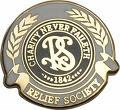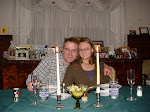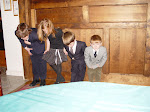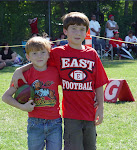Discrimination. The act of distinguishing differences between one thing and another. Distinguishing, showing favoritism, a perception of difference or critic of one thing over another. An ability to discern that something is better. No where in the 2nd College Edition of the New World Dictionary of the American Language does it refer to discrimination potential for human beings, only things. Are we human beings mere things? This is the issue, and is it really black or white?
Here in the New World, English was adopted as the native language; we speak a language from a foreign country. We propose to be American; a people of this land, yet we are immigrants no less. And we claim to equally speak English, but do we really speak American, Mexican, black, Chinese, German? Is our speech about the language, or is it about the color of our roots. And is it really language or is it dialect? The roots of these questions are as ugly and as obvious as a bad bottle job on prom night. Obviously we still associate people with things.
What does our reaction to the reference of speaking Mexican say about who we are? Does our reaction prove we human beings are being human things? Are we what we speak?
In any new situation by nature we begin to acclimate ourselves to what is familiar, as well as make quick judgments about what is not. We associate comfort with things that are similar to ourselves. We hear sounds and we use our background to make associations to things we are familiar with or whether the sounds are entirely new to us. When something is new we discriminate, it is good, is it bad, is it comfortable, is it worthwhile, is it black or is it white? Again, all our discrimination point to things, not beings. The real issue for me is when in society did we begin to associate human beings with being human things.
My initial thought to whether or not I judged others based on their dialect was that no, I did not notice, but as I took the racial profiling quiz I realized that it is very natural to me to think that I hear a race within a sound. That became very deceiving to me as I watched some of the videos. I did not like learning about myself that auditory profiling feels natural, as if it is part of a that person’s very make up. And my judgments are a very part of mine. From the exercise I became acutely aware of the differences in dialect within my home, how my son talks to me adversely when he talks to his friends, and then how he talks to me around his friends. Why does he feel the need to change his dialect so much? It felt very personal to me that he sounded different talking to me about taking him to his basketball game because his friend was in the room. It was very apparent to me as he called later to apologize to me for talking the way he did, that he was even as aware of the difference in his tone. This same son has strong opinions about half of his school speaking Mexican, as if he is better than they. An issue that makes me wonder WHERE he came from; and certainly where he adopted his opinions from.
It is time to disembark old ways and to engage in ways of a true New World. Ways that allow us all to talk in our language, our English, native to our home, and possibly no different than how we would speak to our mothers, friends present or not; kinder and gentler tones, in how we speak and in how we listen. Is there a possibility of discoloring language, so that we are more beings than things? While I have never thought of myself as a person who hears color, I do think that it is a little too human being that we hear in color. And we all alter our voices to some degree or another when we are talking. The emphasis we put on our words through sound sometimes says more than the words themselves.
In accounting for the anger and frustration that people feel when being judged for the sound of their voice, their reactions are rightly so. There is nothing more personal than what truly comes from within and your voice is the most within thing that you can portray. It is so personal to you and yet so far from the person you are.
I think possibly we can change, I think there is a New World English that habituates all our ways, collectively, all our tones, divisively, and has the potential to make us auditory blind and true listeners; deaf to the color of our sound. A favorable future; auspicious, authentic, American.















































.jpg)















4 comments:
I no entiende Ingles, hablo Espanol. Te amo. Estoy totalment de acuredo con todo lo que dice. Espero que tengas un gran dia.
makes me think. OUCH
Excellently written.
WOW! DEEP! AND a well-written piece. Lots of thought--stacie, I had NOT A CLUE, who you are, until tonight!
And it is an honor to be invited to know you here...or anywhere.
I;m excited! It's gonna be fun reading your stuff. Hope you post OFTEN, and "blongs" are fine!
Post a Comment